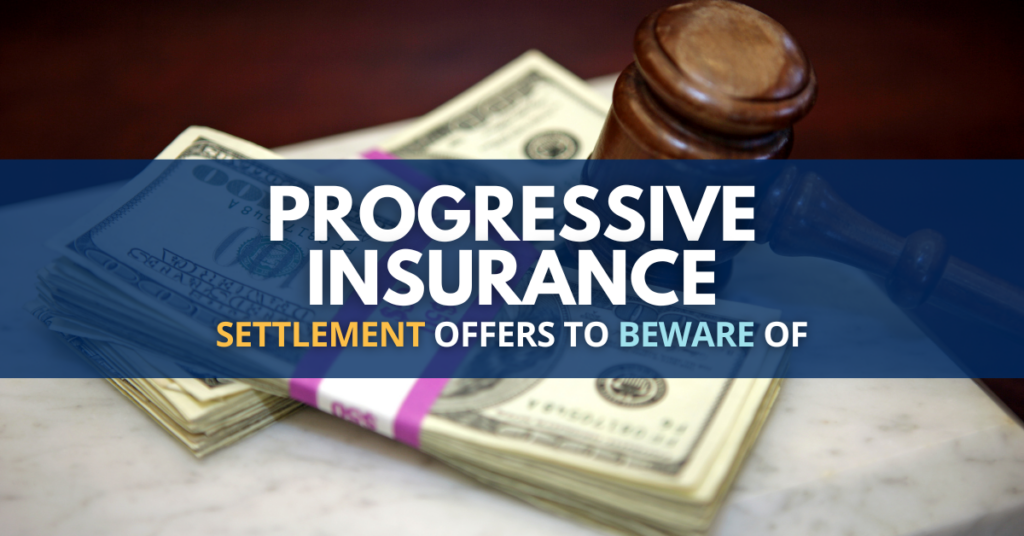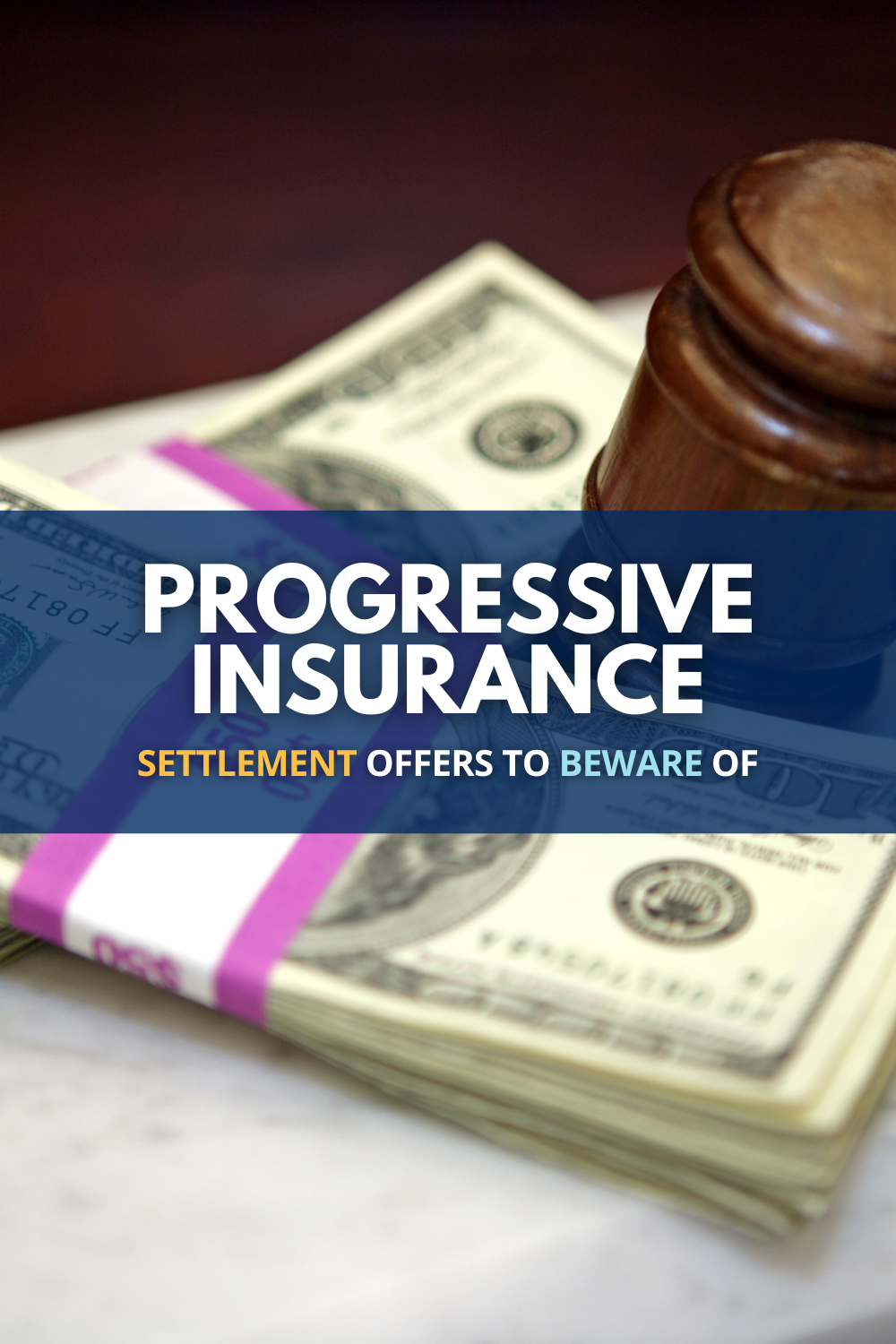
Watch out for Progressive insurance settlement offers if you are injured in a car accident. They can include releases whose language goes beyond what you may think the settlement is for. Specifically, this release language can extinguish all of your legal rights, including for future No-Fault insurance benefits.
It’s crucial that car accident victims know about these Progressive insurance settlement offers. Too often, there is a trap that is being set for the unwary. What may look at first like a check to pay for one thing, such as for a mini tort payment, is actually being proffered by the company to release legal rights and future No-Fault insurance benefits.
UPDATE: Beware Progressive insurance settlement offers in regards to your future No-Fault benefits (“futures”)
Your legal right to future No-Fault benefits, including future medical care, is one of your most valuable rights under Michigan’s auto No-Fault law. These are often referred to as “futures.” This means that even if you need an expensive medical treatment like a future surgery or an expensive diagnostic test, as long as a doctor orders it and relates it to your car accident and says it is reasonably necessary, you can get this done years into the future and this No-Fault insurance company – or any other No-Fault insurance company in Michigan – still has to pay for it.
So leave it to this insurance company to start calling all of their customers who’ve been injured in car accidents and offering very low settlement offers to waive these rights to future medical care.
Progressive Marathon is making a strong push to get its customers to settle these rights to future medical care. Our auto accident attorneys have started to get phone calls from our own clients – both current and past clients – who say they are getting phone calls about Progressive insurance settlement offers from claims adjusters offering them money to settle out their future right to medical care. This insurance company is preying on its own customers’ financial insecurity after a crash by offering them little bits of money to waive and release their most valuable legal right to get future medical care, no matter how expensive, paid for by Progressive.
I don’t normally use words like shameful on this auto law blog, but the deliberate decisions by this auto insurance company to take advantage of their own customers like this is shameful. There’s just no other word.
Beware of this type of Progressive insurance settlement offer because if a customer settles out his or her futures, and gives up their right to future medical care, that means that your auto insurance will be off the hook and will have no legal obligation to pay for any more of your medical bills. From the moment you agree by signing the insurance company’s release, the insurance company’s legal obligation is over. For however much longer it takes you to complete your own medical recovery – whether it’s months, years or even decades – you, personally, will have to now pay for all of your future medical bills. It’s a lot to give up for a very little amount of money.
Progressive Marathon’s manipulation of Progressive insurance settlement offers
In my 26 years as a No-Fault and car accident lawyer, I’ve seen plenty of examples of insurance companies mistreating their customers, underhanded tricks, and breaking promises. In real life, how insurance companies treat their own customers is often very different from what we see on the commercials.
Progressive Marathon provides the latest example. Progressive insurance settlement offers are often being accompanied by releases that have overly broad language that can release all legal rights and No-Fault benefits. They have been attempting to exploit injured car accident victim’s financial desperation, trust and lack of experience with contract law. These releases are very dangerous and people need to be very careful before signing them.
Progressive Marathon Insurance Company is no stranger for regular readers of this auto law blog. It’s also no surprise that this company was the most-complained-about auto insurance company in Michigan in 2021, according to the most current consumer complaint information compiled by the Department of Insurance and Financial Services (DIFS). In other words, more customers complained about how they were treated by this insurance company than by any other major insurance company doing business in this state.
Even though this company is the second largest auto insurance company in Michigan in 2021 (based on written premiums), it had the dubious honor of beating out State Farm in consumer complaints, even though State Farm Mutual Automobile Insurance Company is the largest auto insurer in the nation.
Significantly, Progressive Marathon also had more than twice as many consumer complaints as Progressive Michigan Insurance Company (third largest) and nearly double the consumer complaints of Home-Owners Insurance Company and Memberselect Insurance Company (third and fourth largest auto insurers, respectively).
Progressive Marathon Insurance Company and Progressive Michigan Insurance Company are both subsidiaries of the Progressive Corporation. They are the only two of their subsidiaries selling auto insurance in Michigan.
Settlement checks and Progressive insurance settlement offers
One of the Progressive insurance settlement offers that our auto accident attorneys have seen them doing – with our own clients and people who call us for help – is to send a check out to people after they’ve been injured in a car accident (and after they’re worried about how they will support their families and pay their bills).
This is what you need to watch out for with Progressive insurance settlement offers:
- Progressive Marathon will send the victim a check that appears to be a payment for a No-Fault benefit, for example, for lost wages after a car accident. The check and/or the supporting paperwork – which is ironically and quite misleading titled “Advice for Payment” – may identify the “type” of payment as “wage loss.”
- The amount on the settlement check may seem appropriate as a wage loss payment and therefore may not set off alarms or alert someone that this check is actually being proffered to pay for No-Fault benefits that go far beyond a simple payment for wage loss. This check is actually being offered by the insurance company as a full and final settlement offer. It is also just a fraction of what a person is legally entitled to and what his or her No-Fault injury claim is really worth if someone is injured, can’t return to work, and needs medical care.
- How these Progressive insurance settlement offers play out is that on the check itself or in the accompanying “Advice for Payment” paperwork (shame!), Progressive Marathon has described the payment as “Full and Final Settlement of PIP Claim.” “PIP” is an acronym for “personal injury protection” or “personal protection insurance” – which is another way of saying No-Fault benefits. To those with experience with the No-Fault law and auto insurance contracts, the meaning of PIP is obvious. To most people without such experience – a category that probably includes most lawyers in this state as well who don’t litigate car accidents and aren’t familiar with Michigan’s auto law – PIP likely means absolutely nothing.
- Notably, the “Full and Final” language may appear in the “Description” box on the “Advice for Payment” paperwork.
- Without even suspecting anything wrong with the Progressive insurance settlement offer thinking they have your back (especially after years of loyalty and paying all those expensive premiums for all of those years) would try to take such obvious advantage of your trust, a customer then cashes the check.
- Tragically, because of the “full and final settlement” language, what seemed at first like just a routine insurance payment has actually proved to be a full settlement of all of your claims and legal rights for No-Fault insurance benefits arising from your car accident.
As a result of this Progressive insurance settlement offer, a person who signs this release and cashes this check has permanently lost all of his or her legal rights to require Progressive Marathon to pay the No-Fault benefits that it was contractually and legally obligated to do.
Progressive insurance settlement offers like this mean a car accident victim can no longer have them pay for his or her accident-related medical bills and lost wages.
Releases and Progressive insurance settlement offers
Other Progressive insurance settlement offers that have been sprung on unsuspecting people injured in a car accident involves the very troubling use of releases.
The scenario plays out similar to the one involving checks that I describe above, but the trap for the unwary is in the release language that accompanies the Progressive insurance settlement offer and check. The release is required to be signed in order to cash the check.
That wouldn’t normally be a problem. Every company would normally insist on a settlement release to be signed first before sending out a check.
But here, the settlement release is likely to read as follows:
- “Full Release of Michigan No-Fault Personal Injury Protection (PIP) Benefits”
- “For and in sole consideration of the amount of [dollar amount],” the claimant “does hereby release and discharge Progressive Marathon Insurance Company (hereinafter referred to as “Progressive”) from any and all claims and demands for no-fault insurance benefits, of any kind whatsoever, for any and all expenses incurred by or on behalf of claimant arising out of the accident referenced above . . .”
As with the consequences for cashing a settlement check that I described above, the consequences for signing these types of legal releases from Progressive Marathon – or any other auto insurance company – are dire.
By accepting the Progressive insurance settlement offer, cashing the check and signing the release you are releasing them from everything they are contractually and legally obligated to pay.
What you can do to protect yourself
My advice for how you can protect yourself against these dubious Progressive insurance settlement offers is as follows:
- First, always talk to an experienced auto accident attorney immediately and BEFORE YOU CASH ANY CHECK OR SIGN ANY RELEASE. This is not “self-serving” advice. You don’t have to hire a lawyer and you don’t have to pay a lawyer. Any lawyer worth his salt has a free first initial consultation, and making just one simple phone call can save you from disaster.
- Second, run for the hills – meaning please make sure you know fully what you are signing when it comes to a Progressive insurance settlement offer – if you see any of the following language (or variations thereon) on any check (or paperwork accompanying a check) from any company: “Full and final payment”; “Full and final settlement of PIP claim”; and/or “Final Settlement of Any & All Claims.”
- Also, talk to an experienced auto accident attorney immediately and BEFORE YOU SIGN ANY RELEASE if you see any of the following language (or variations thereon) on a release from the insurance company: “Full Release of Michigan No-Fault Personal Injury Protection (PIP) Benefits”; “Release of all claims”; “Agrees to release and discharge . . .”; and/or “Agrees to release, acquit and fully discharge.”
- Try to give the money back. If you did not realize that your auto insurance company intended the settlement check to be a full and final settlement of your entire claim and all of your legal rights and No-Fault benefits until after you cashed the check and after you signed a release, then “tender[] repayment” of the money to your auto insurer “within 90 days after” having received the check. (MCL 440.3311(3)(b)). Timing matters here, you have to do this right away.
- If you have received a bogus Progressive insurance settlement offer file a complaint with the Insurance Commissioner (also known as the Director of DIFS) against both the company and the adjuster for fraud and/or the unauthorized practice of law. Many states protect against this type of predatory conduct by insurance companies and in many states, this is illegal. But in Michigan, it is happening to unsuspecting people even as you read these words.
- File a criminal complaint against both the insurance company and the adjuster for the unauthorized practice of law under MCL 450.681 and MCL 600.916.
- File a complaint with the State Bar of Michigan against both the insurance company and the adjuster for the unauthorized practice of law under MCL 450.681 and MCL 600.916. [NOTE: Under Rule 16 (“Unauthorized Practice of the Law”) of the Michigan Supreme Court’s “Rules Concerning the State Bar of Michigan,” the State Bar of Michigan is “authorized and empowered to investigate matters pertaining to the unauthorized practice of law and, with the authority of its Board of Commissioners, to file and prosecute actions and proceedings with regard to such matters.”
Here’s the law that prevents corporations and individuals from engaging in the unauthorized practice of law:
- “It shall be unlawful for any corporation . . . to . . . render or furnish legal services or advice . . . or to furnish legal advice, services or counsel . . . [N]o corporation shall be permitted to render any services which cannot lawfully be rendered by a person not admitted to practice law in this state . . .” (MCL 450.681)
- “A person shall not practice law or engage in the law business, shall not in any manner whatsoever lead others to believe that he or she is authorized to practice law or to engage in the law business . . . unless the person is regularly licensed and authorized to practice law in this state.” (MCL 600.916(1))
At Michigan Auto Law, our attorneys can protect you
If you have been injured in a car accident and you have questions about a Progressive insurance settlement offer like the legal consequences of cashing a check or signing a release from after your car accident, call us toll free anytime 24/7 at (800) 968-1001 for a free consultation with our experienced auto accident attorneys. You can also e-mail and get help from an experienced auto accident attorneyby visiting our contact page or you can use the chat feature on our website.



